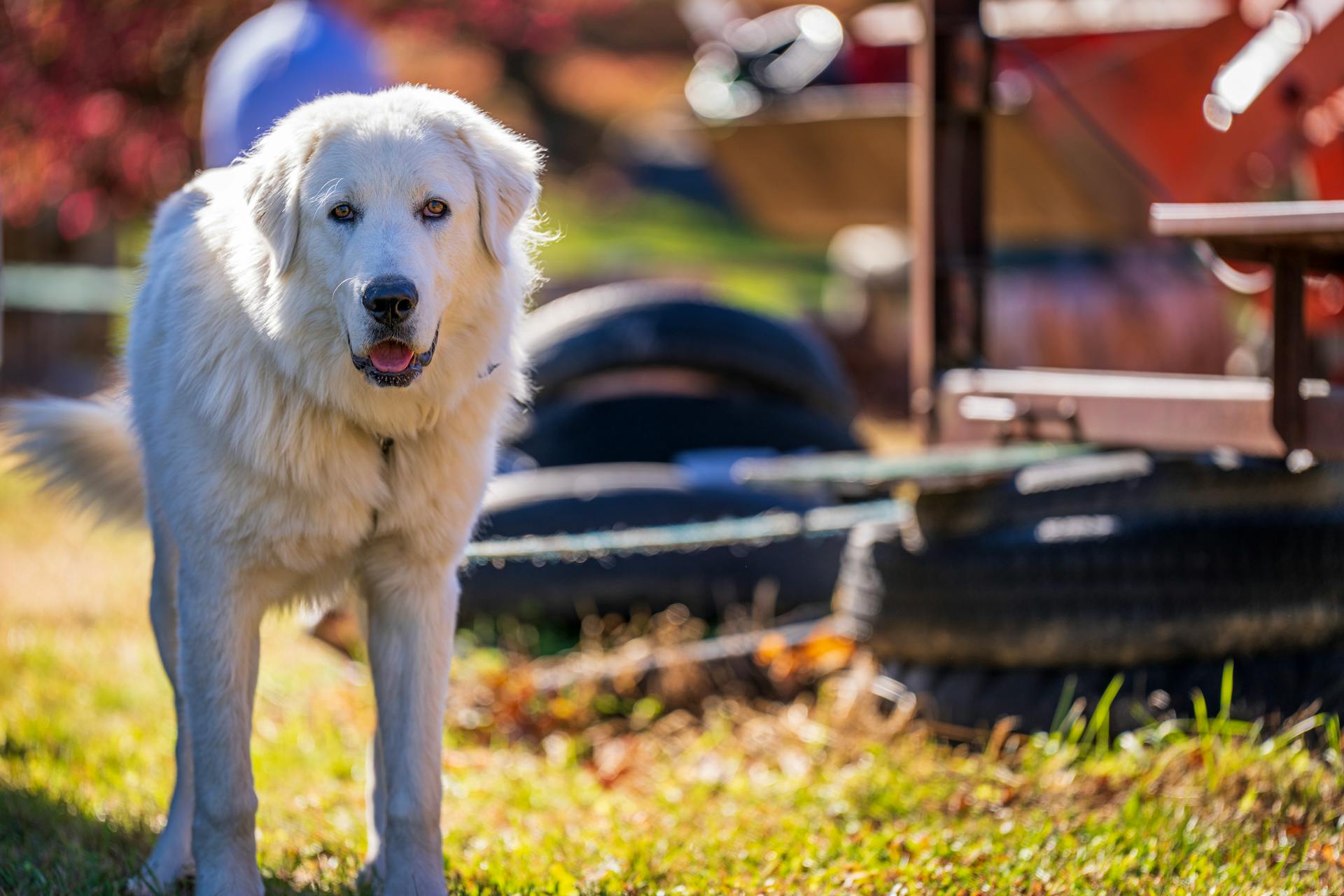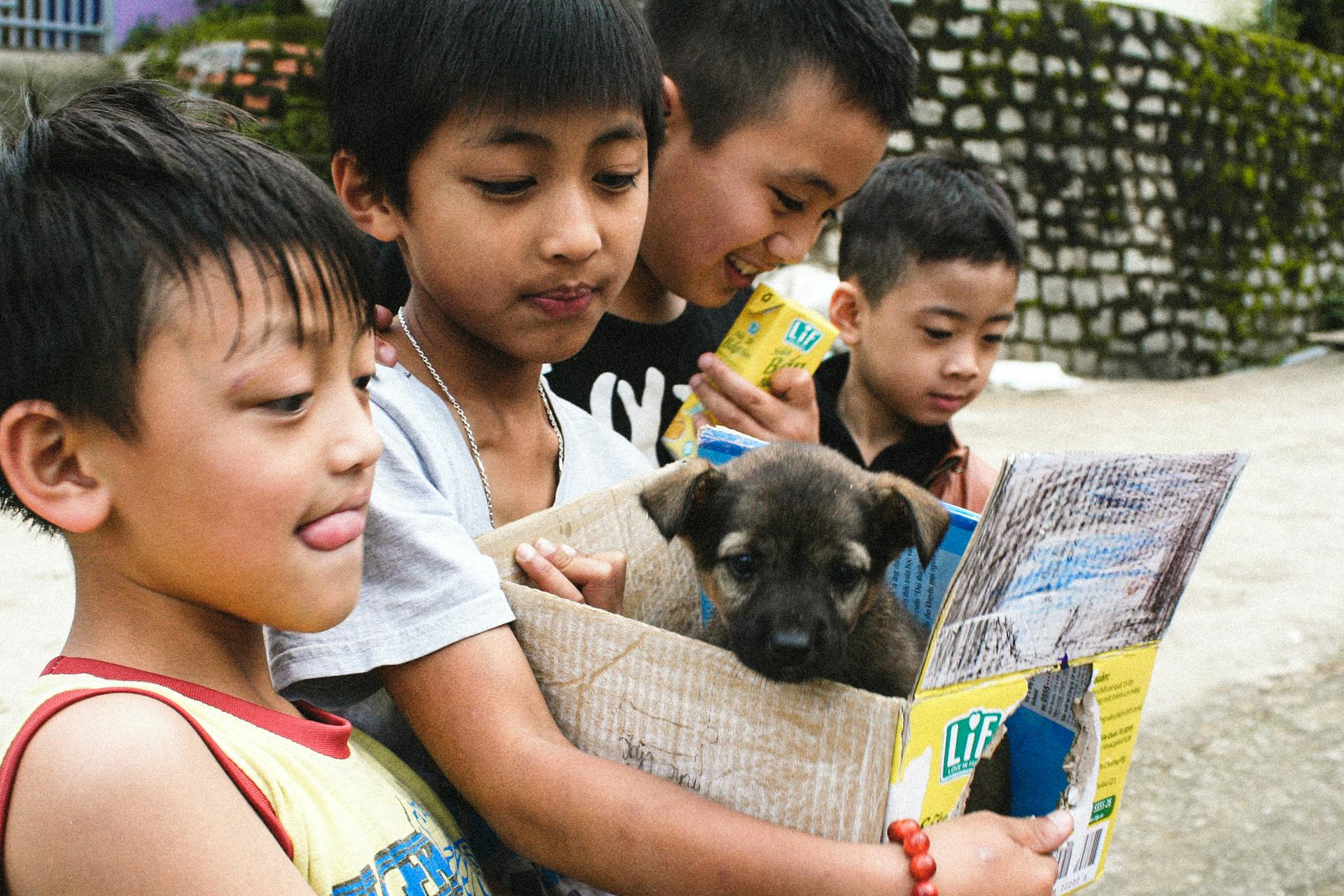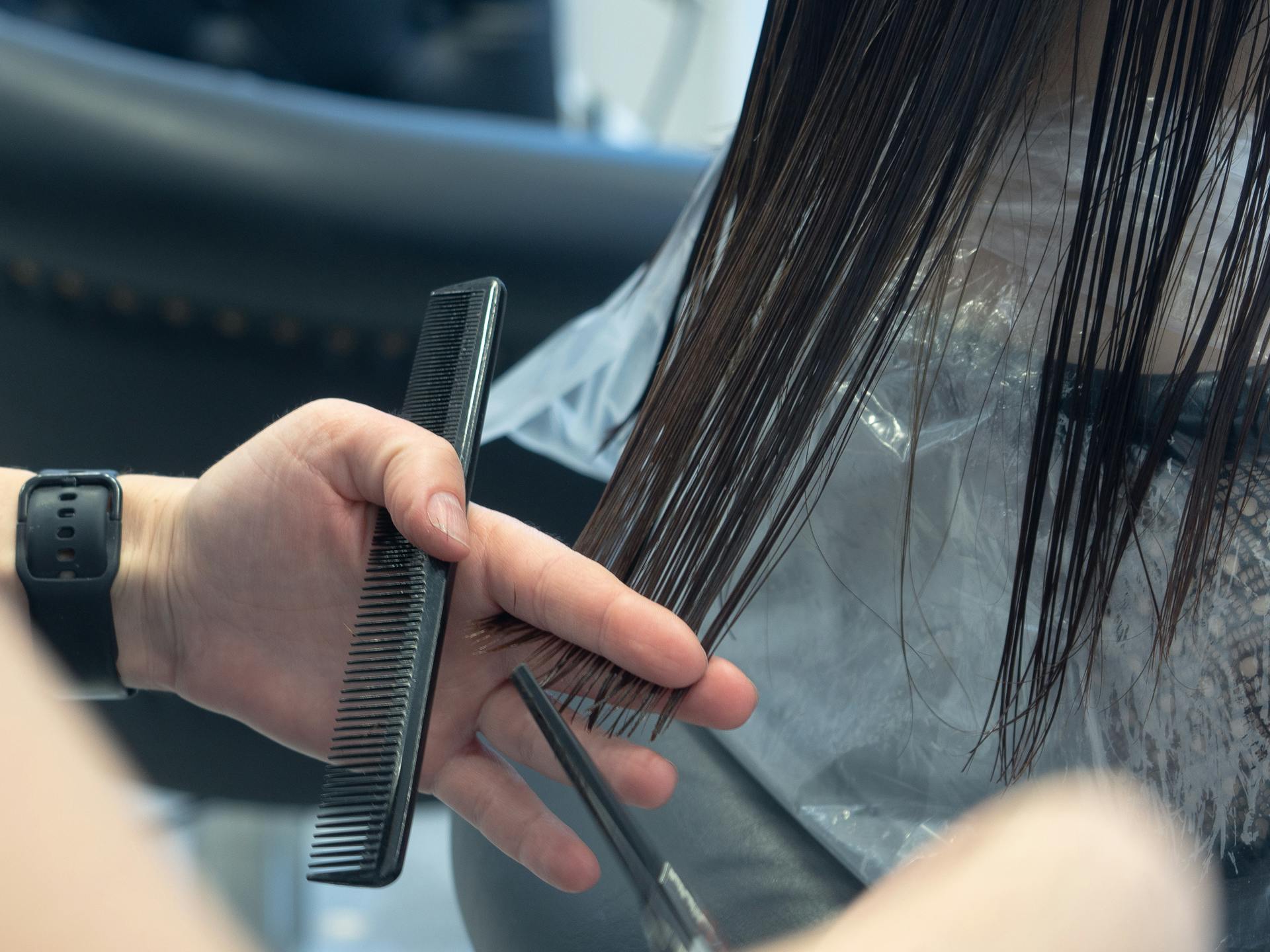
Welcoming a Great Pyrenees puppy into your family is a thrilling experience, but it's essential to be prepared for the challenges and joys that come with raising one of these gentle giants.
Great Pyrenees puppies need plenty of room to run around and play, so if you live in an apartment, this might not be the best breed for you. They require a minimum of 1/4 acre of land to roam and exercise.
Their thick coats require regular brushing to prevent matting and tangling, so be prepared to spend some time each day grooming your Pyr. Great Pyrenees shed heavily, especially during shedding season, so factor in extra time for brushing and vacuuming.
Great Pyrenees puppies are naturally protective of their family and territory, so early socialization is crucial to help them develop good manners and a calm temperament. This includes exposing them to new people, places, and experiences from an early age.
Explore further: Why Do Great Pyrenees Bark so Much
Personality and Temperament
The Great Pyrenees is a breed known for its calm and gentle demeanor. They're a great fit for families with children who understand how to interact with dogs.
As a breed that's been used for centuries as a flock guardian, they can be strong-willed, so early socialization and training are essential. This means that with proper training, they can thrive in a variety of living situations.
Great Pyrenees are generally friendly and well-mannered dogs that enjoy human company. They're also usually trustworthy, calm, and gentle.
If you're considering bringing a Great Pyrenees into your home, it's essential to socialize them with other animals at a young age. This will help them get along with other pets, such as cats and other dogs.
Here are some key temperament traits to keep in mind:
- Generally friendly and well-mannered
- Trustworthy, calm, and gentle
- Like well-mannered children if socialized with them
- Can get on well with other animals if socialized at a young age
- Tend to like to bark, playing their role of protector and guardian dog
It's also worth noting that Great Pyrenees are alert and independent, making them a great fit for families who want a low-maintenance pet.
Puppy Care Basics
Great Pyrenees puppies are a big responsibility, but with the right care, they can thrive. They need regular grooming to stay healthy and looking their best.
You can expect to pay between $1,750 to $2,500 for a reputable breeder, and it's worth the investment to get a puppy that's been screened for health and temperament issues. Their calm and gentle nature makes them a great companion for families.
Great Pyrenees puppies need plenty of time with their family to prevent boredom and destructive behavior. A physical fence is also a must, as their thick fur and high pain tolerance can lead them to ignore an electronic fence.
Here's an interesting read: What Do Puppys Need
Puppy Care
The Great Pyrenees is a high-maintenance breed, but with the right care, they can thrive.
You'll need to groom your Pyr regularly to keep them looking their best. Grooming is less overwhelming than you might think, but it's essential to ensure they stay healthy and well-behaved.
Their thick fur requires regular brushing to prevent matting, and they need to be bathed occasionally to keep them clean.
Their calm lifestyle makes them a great companion in an urban household, but early socialization is key to help them be their best self.
They need to spend plenty of time with the family to prevent boredom and destructive behavior. If left alone for too long, they may try to escape to pursue suspected predators.
A physical fence is necessary, as they can ignore an electronic fence due to their thick fur and high pain tolerance.
They'll benefit from having a job, such as guarding homes or training for obedience competitions, to keep them engaged and happy.
You might enjoy: How to Keep Great Pyrenees on Property
Adopt/Buy
If you're looking to bring a Great Pyrenees puppy into your life, you've got two main options: adopting or buying. Expect to pay anywhere from $1,000 to $4,000 for a puppy from a reputable breeder.
You can start your search for a puppy by contacting the Great Pyrenees Club of America, which has a breeder referral list.
If you're not set on buying a puppy, searching online can lead you to many local organizations devoted to saving and re-homing Pyrs.
National groups like the National Pyr Rescue and Great Pyrenees Rescue Society are also great resources for finding a rescue Pyrenees.
Grooming and Hygiene
Grooming a Great Pyrenees is less overwhelming than you might think, thanks to their thick, luxurious coat that's resistant to dirt and tangles. Brushing is still necessary, though, to keep them clean and mat-free, so aim for weekly brushing sessions.
Their thick coat sheds a lot, especially their undercoat, so be prepared for a white trail all over your home. Adding extra brushing sessions can help combat this, but it's a given that you'll still see white hairs everywhere.
Trim their nails about every two weeks or whenever you hear them clacking on hard surfaces, which is a clear sign they need attention. Don't forget to brush their teeth daily to prevent gum disease and take them to the vet yearly for a professional cleaning.
On a similar theme: Large White Dog Breeds Great Pyrenees
Grooming
Great Pyrenees are surprisingly low-maintenance when it comes to grooming, despite their thick coats. Their coats are dirt- and tangle-resistant, making them a breeze to care for.
Weekly brushing is a must to keep their soft undercoat healthy and minimize shedding in the home. Brushing several days a week can be beneficial, especially with a slicker or rake brush.
Their nails need regular trimming, ideally every two weeks or when they start to touch the floor when the dog is standing. You'll know it's time when you hear the clacking sound on hard surfaces.
Daily teeth brushing is essential to prevent gum disease and keep their teeth clean. Brushing at least a couple of times a week is also recommended.
Their coats naturally shed dirt, so bathing is only necessary once every couple of months. However, their undercoat sheds a ton, leaving a white trail everywhere, so be prepared for extra brushing sessions.
Their ears need regular checking for dirt, wax buildup, and other abnormalities, ideally once a week.
You might like: Great Pyrenees Exercise Needs
Ear Care
Ear Care is a crucial aspect of your Great Pyrenees's overall health and well-being. Routine ear cleaning with a veterinary-approved ear cleanser is essential to maintain healthy ear canals and prevent ear infections.
After swimming or bathing, it's essential to clean your Pyrenees's ears to prevent water from accumulating and causing infections. This simple habit can make a huge difference in your dog's comfort and health.
Suggestion: Great Pyrenees Common Health Problems
Training and Behavior
Training a Great Pyrenees puppy can be a unique experience. They are known to be quite stubborn, so it's essential to be patient and consistent.
Great Pyrenees are intelligent dogs, but they're not like Border Collies or other breeds that excel at obedience and competitive sports. They need to be trained with a different approach.
To make training a positive experience, use reward-based methods such as treats, praise, and playtime. Keep training sessions short and varied to keep your pup engaged.
With Great Pyrenees, slow and steady wins the training race. They may not be the most obedient dogs, but with time and effort, they can learn to be well-trained.
It's crucial to remember that Great Pyrenees are independent dogs and need their alone time. They may value their space, especially when they're feeling overwhelmed.
To help your Great Pyrenees puppy thrive, enroll them in obedience classes for training assistance. Consistency and positive reinforcement are key to successful training outcomes.
Socialization from a young age is vital for this breed, as they can be naturally suspicious of strangers. Early socialization will help them become well-mannered and comfortable in new situations.
Here are some essential tips to keep in mind:
- Be patient and consistent when training your Great Pyrenees puppy.
- Use positive reinforcement techniques such as treats, praise, and playtime.
- Keep training sessions short and varied to keep your pup engaged.
- Provide your Great Pyrenees with plenty of alone time and space to retreat when needed.
- Enroll your puppy in obedience classes for training assistance.
- Practice early socialization to help your puppy become confident in new situations.
Diet and Nutrition
The Great Pyrenees is a large breed that requires a specific diet to stay healthy. They do well on high-quality commercial dog food that's low-protein and specially made for large breeds.
Their age is a crucial factor in choosing the right food, so consider your puppy's stage in life and choose a formula that fits their needs. Puppies should initially eat four times a day, then down to three, then to two at six months old.
Great Pyrenees are prone to bloat, so it's essential to feed them smaller portions multiple times a day and avoid vigorous exercise around mealtimes. They can also benefit from slow feeder bowls designed to make them eat more slowly.
For another approach, see: Puppy Food for Great Pyrenees
Here are some general guidelines for feeding your Great Pyrenees puppy:
- Feed two meals per day of up to 3 cups of dry dog food per meal.
- Use a brand formulated for large breeds to help prevent bloat.
- Monitor your puppy's weight to prevent overfeeding and obesity.
Remember to always consult with your veterinarian to determine the best diet for your Great Pyrenees puppy based on their individual needs and medical history.
Diet and Nutrition
Great Pyrenees have specific dietary needs that require attention to ensure they stay healthy and happy. Always choose high-quality commercial dog food that's low-protein and made for large breeds.
To prevent bloat, a serious gastrointestinal concern, feed your Great Pyrenees smaller portions multiple times a day. Exercise should be kept to a minimum around mealtime to further reduce the risk.
Treats are okay in moderation, but be mindful of the calories they add. Too many treats can lead to obesity, which can cause health problems down the road. Consult with your vet for guidance on choosing the right food and portions for your pup.
A good rule of thumb is to feed your Great Pyrenees two meals a day of up to 3 cups of dry dog food per meal. However, the exact amount depends on size, activity level, age, and other factors, so discuss your dog's individual needs with your veterinarian.
See what others are reading: How Much to Feed a Great Pyrenees Puppy
To avoid overfeeding and obesity, monitor your dog's weight regularly. A Pyr should have a nice tuck from their chest up to their tummy, and you should be able to comfortably feel their ribs, but not count them, when they're standing normally.
Here are some general guidelines for feeding your Great Pyrenees:
- Feed adult Great Pyrenees twice daily.
- Feed puppies four times a day initially, then down to three, then to two at six months old.
- Gradually transition from puppy to adult food between 18 and 24 months old.
Remember to choose a dog food designed for large breeds and suitable for your dog's current life stage (puppy, adult, or senior). Always consult with your vet for personalized advice on your dog's diet.
Do You Need a Lot?
Great Pyrenees have thick, fluffy, double coats that help keep them cool in summer and warm in winter.
They need to be groomed 1-2 times a week, more often when they are shedding heavily, which is most commonly seen in the springtime.
Regular grooming is essential to prevent matting and tangling of their fur.
You can bathe them every 1-2 months or if they roll in something dirty and need a good wash!
Like any dog, regular tooth brushing with a dog-specific toothpaste twice daily is ideal.
Exercise and Environment
Exercise and Environment are two crucial aspects of great pyrenees puppy care. A daily exercise routine of 1 hour, broken into 20-30 minute sessions, is ideal for these gentle giants. Consistency is key, so aim for two to three walks a day.
As a breed originally developed to guard sheep, great pyrenees puppies need space to move around and patrol. Outdoor space, such as a fenced-in yard or a park, is perfect for them to stretch their legs and get some exercise. However, if you live in a small apartment or city home, don't worry – you can still meet their exercise needs with regular outings.
Climate plays a significant role in a great pyrenees puppy's ideal environment. They were bred to thrive in cooler locations, so if you live in a warm climate, be sure to keep outdoor activities to cooler parts of the day and provide plenty of fresh, cool water.
A different take: Great Pyrenees outside Dog
Here's a rough guide to great pyrenees puppy exercise needs:
- Adult great pyrenees: 1 hour of exercise per day
- Puppies: Not over-exercised until fully grown (18-24 months)
- Physical and mental stimulation: A must for these intelligent dogs
- Sniffs and investigation: Essential for a happy great pyrenees puppy
Remember, great pyrenees puppies value their alone time, so be patient and confident when training them. With the right exercise and environment, your great pyrenees puppy will thrive and become a loyal companion.
Health and Wellness
Great Pyrenees are generally very healthy dogs, but they can be prone to certain health issues. With the right care and attention, you can help your pup live a long and happy life.
Their average lifespan is 10-12 years, which is a little longer than the average life expectancy for giant dogs. This is a great reason to bring one home, but it's essential to be aware of the potential health issues they can develop.
Bloat, also known as Gastric Dilatation-Volvulus (GDV), is a genetic condition that can be life-threatening if not treated immediately. Feeding your pup smaller meals more frequently throughout the day can help prevent bloat.
A fresh viewpoint: Great Pyrenees Skin Issues
Eye conditions like canine multifocal retinopathy, cataracts, and entropion can affect Great Pyrenees. These conditions can lead to vision loss and blindness, but surgery can often correct them.
Congenital deafness is more common in dogs with white skin and fur, like the Great Pyrenees. While there's no cure for deafness, dogs who lose hearing tend to do well at home with minimal accommodations.
Neuronal Degeneration (NDG) is an inherited disease that affects the nervous system. Genetic screening testing is available, so be sure to ask your breeder about it.
Hip and elbow dysplasia are common joint development conditions in Great Pyrenees. Weight management, joint supplements, and pain medication can help manage the condition, and surgery may be necessary in severe cases.
Here's a summary of the potential health issues your Great Pyrenees may face:
- Bloat or Gastric Dilatation-Volvulus (GDV)
- Eye Conditions: Canine multifocal retinopathy, cataracts, and entropion
- Deafness
- Neuronal Degeneration (NDG)
- Hip and Elbow Dysplasia
- Patellar Luxation
Featured Images: pexels.com


